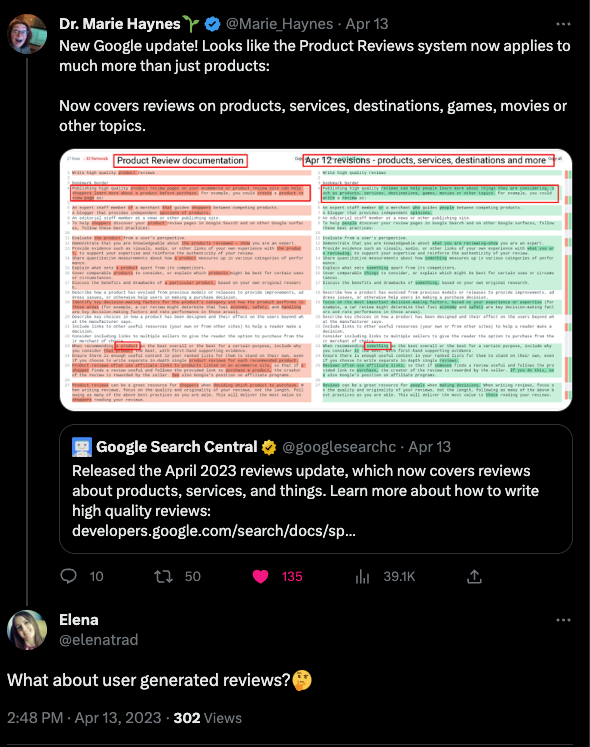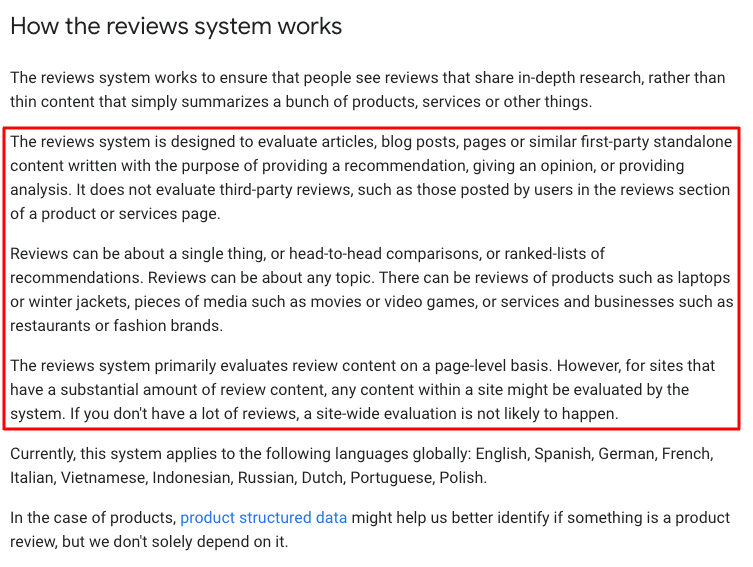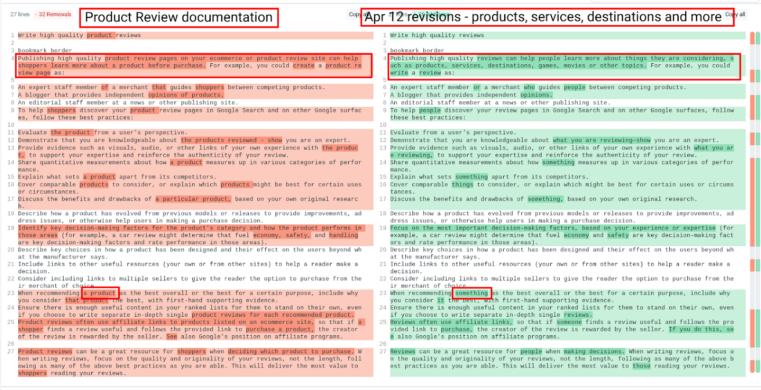Google has released yet another update to its algorithm, this time focusing on the experience signals within reviews.
The April 2023 Google Reviews Update is just one of many updates in Google’s series of algorithm adjustments, but it is an important one since it will have a direct impact on how content with reviews is indexed and ranked.
This update provides web admins and editors more direction when creating review-based content by emphasizing a new signal that Google deems essential: experience.
In this blog, you’ll learn all the answers to the following questions:
• What does this Google algorithm update have in store?
• Is this just another product reviews update?
• How does this affect your online review management strategy?
Here’s a complete guide to this update and how to optimize your content for it.
“In My Experience:” The Extra “E” To Look Out For
Remember the old E-A-T (expertise, authoritativeness, trust) in the Google Quality Rater Guidelines? The April 2023 Google Reviews Update has incorporated the extra “E” into the acronym (now Double-E-A-T): Experience.
For example, you can mention phrases like “in my experience” or “from personal experience,” which will be seen as an authority signal to Google.
This signals that you have direct knowledge about a product or service and can provide an accurate review of it. This is important for page rank because it shows users that you can provide relevant information on the topic at hand.
Following the E-E-A-T Google Quality Rater Guidelines, the Experience component now includes evidence of experience within reviews, including:
• Images and other visuals
• Audio
• Reliable and authoritative links
• Statistics and other quantitative data
It’s also important that the reviews come from reliable sources with relevant credentials or qualifications – think expert opinions or actual customers who have used the product or service.
To recap, the E-E-A-T Google Quality Rater Guidelines also provide that your review content’s quality is assessed on the following:
• Your main review content: If it looks like it took significant effort, originality and talent, it’s probably good.
• You and your website: You shouldn’t be an anonymous capybara or a faceless institution.
• Your reputation: Are you an experienced industry leader or someone who just popped up yesterday? You must have demonstrable expertise and an excellent reputation to meet Google’s E-E-A-T requirements. (See our list of evidence of experience above)
“Following Google’s EEAT guidelines will help them to deliver accurate and worthwhile information to users,” said Don Gruspe, Thrive’s Demand Generation SEO Specialist. “Businesses can present themselves as trustworthy sources by showcasing competence, establishing authoritativeness, and emphasizing trustworthiness.”
Who’s Affected by This Update?
Somebody in the community forums asked if this applies to third-party user reviews. Based on Google’s help documentation, this is not the case.

Screenshot from Twitter
According to Google, this product review update “does not evaluate third-party reviews, such as those posted by users in the reviews section of a product or services page.”
So, for who and what is this update?
Based on the same Google help document, the Reviews System evaluates reviews about anything. It’s designed to scour articles, blogs, pages and other first-party content with the intention to:
• Provide a recommendation.
• Give an opinion.
• Provide analysis.
Google also provides examples of reviewable content to substantiate “anything”:
• Product reviews, like laptops, jackets, video games and more
• Services
• Businesses like restaurants and brands in general

Screenshot from Google Search Central
So, if you’re publishing content that contains reviews about any of the above, then you are now affected by this Google update.
If you’re not sure what to modify because of this update, then you’ll need an SEO expert.
SEO experts “can conduct comprehensive audits to ensure the content aligns with the update’s focus on ‘Experience,’ enhancing relevance, accuracy, and credibility,” said Ken Romero, an SEO Strategist at Thrive. Experts analyze the impact of the April update and beyond on several content evaluation aspects, including:
• Visuals
• Audio
• Links
• Statistics
Furthermore, consulting with SEO specialists allow you to “devise strategies [that] optimize these elements for improved search rankings,” said Romero.
Not a Mere Product Reviews Update. It’s More of a Revision.
Unlike any previous Google update, the April 2023 edition revises critical parts of Google’s help document for reviews.
In a tweet by Dr. Marie Haynes, you can see these changes highlighted in the picture shared by Twitter user Dr. Martin Hayes below:

Image from Twitter
The most notable of these changes is the shift from specific “product reviews” to just “reviews” to guide users in structuring review content.
While this may seem like a small change, the digital marketing implications are far-reaching. This means that web admins and editors will have to optimize the quality of their reviews on any topic rather than just product reviews.
For example, if you’re writing a review about a franchise restaurant, the same guidelines that applied for product reviews still apply. What’s important is for your content to have actual evidence of experience from customers or experts.
You can provide the following:
• Pictures of yourself and other customers at the restaurant.
• Audio recordings of your experience.
• Reliable and authoritative links to reviews or quantitative data, such as ratings for certain dishes.
This must be an effort to weed out low-quality reviews containing inaccurate or misleading information.
Expert Tips To Maximize This Google Reviews Update
This Google algorithm update may seem overwhelming if you’re regularly creating review-based content. However, you can ensure your content complies with the updated guidelines with the right approach and optimization techniques.
Here are the insights of organic SEO company experts to improve your online review management game.
1. Show Your Expertise
While this is a new Google reviews update, the same rules of experience still apply.
This means that, as an editor or webmaster, you must show off your expertise by “providing detailed and insightful content that goes beyond generic descriptions,” said Gruspe.
He further explains that “incorporating personal anecdotes and real-life experiences creates a connection with the audience, while mentioning relevant qualifications and certifications establishes authority.”
An excellent in-depth analysis typically has the following elements:
• Detailed introduction to the topic.
• An analysis of the product or service’s features and benefits.
• Comparison against similar products/services.
• Conclusion with actionable advice.
Ensure you use the correct terms and research the topic extensively before writing your content. This shows you know what you’re talking about and can be trusted to provide the best advice.
Leveraging user-generated content also helps with reinforcing expertise and customer trust.
2. Do Your Own Research and Show It on Your Content
As part of the Google algorithm update, quality reviews also require a decent amount of research.
This could include the following:
• Customer reviews
• Product comparisons
• Industry-related news about the topic
You can also lean into qualitative research, such as surveys and interviews with customers or experts, to back up your review. This creates more trust, as it has real-world evidence to back up the facts.
3. Link to Useful Resources
Building on the previous point, it’s vital that your content links to useful resources.
These can include:
• Reviews from other customers or experts.
• Statistical data or quantitative numbers about product performance.
• Competitor products or services.
These resources help readers understand the context of your review better and prove that you’re not promoting any particular product or service unfairly.
By providing these links, you show Google that you are a credible source of information and help increase your page rank.
4. Be Fair
Quality reviews can’t be uber-salesy, and the new Google algorithm update doubles down on this point.
Reviews should be honest and impartial, as any biased opinion or puff piece will affect your page rank negatively. Also, don’t make false promises in your reviews. If a product doesn’t have the features you promised, readers will quickly lose trust in your content.
That’s why evidence of experience is necessary. To highlight a product’s features, you must provide real-world examples to back it up.
Want to convince readers to eat at a particular restaurant? Provide evidence that you “actually” like the restaurant and had a good experience there.
Maybe you’re reviewing a tourist destination. The best way to do this is to provide pictures of your experience.
5. Be as Helpful as Possible
All decent organic search engine optimization services will tell you that the goal of any quality review is to be helpful.
To do this, make sure your reviews contain actionable advice to help readers decide.
Discuss the benefits, drawbacks and first-hand evidence on why you included this data in your review article.
An organic SEO company helps identify what readers are looking for and offers search marketing solutions for your business.
If your reviews contain helpful advice, you’ll have a good starting point to improve your content’s ranking on Google.
Tools To Optimize Your Reviews for Google’s EEAT Guidelines
Whether you’re starting out with review-based content or already pumping out content regularly, there are some tools that you can use to streamline your process.
Nanette Taripe, Thrive’s Senior SEO Strategist lists some of the tools you’ll need for a successful review-based content strategy:
• Camera: for original, high-quality photographs and videos of the reviewed products and services.
• SEO tools: for optimization suggestions and guidance regarding content quality and ranking factors. Taripe suggests the following tools to get started:
○ Semrush SEO Writing Assistant
○ SurferSEO
○ Clearscope
○ Frase
• Content creation platforms: these platforms typically provide personalized content ideas, facilitate writing, optimization and publishing of articles. Here are some platforms you can use:
○ Creator.co
○ Impact.com
○ Upfluence
○ Influencity
Leveraging these tools can be expensive and time-consuming, though. So, be sure to consult with experienced SEO and content experts to ensure you’re getting the most out of these tools and your strategy in general.
Navigate and Win the SEO Game With Thrive
April 2023 ends the long product reviews update timeline that started in 2021. Now, your review-based articles that go beyond physical products have a chance to shine as long as they’re optimized for SEO best practices.
At Thrive, we understand the importance of quality reviews that pass Google’s updated guidelines.
With our tailored organic search engine optimization services, your content can reach the top page rank results.
Need a technical SEO audit? No problem. How about more website conversions? We can do that too, and more. No matter what you need, our team provides personalized solutions that help you reach and maintain your SEO goals.
Get in touch and unlock your content’s search potential – review-based and otherwise.








